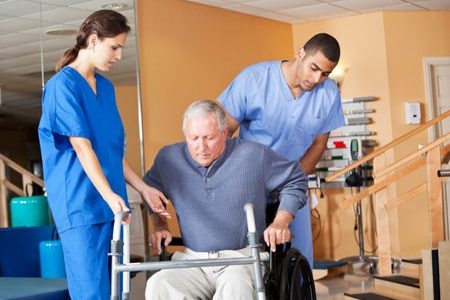Patient Care Technicians (PCTs) are vital in the healthcare system because PCTs help deliver hands-on, direct patient care. PCTs can make a meaningful difference in the lives of patients because of their direct care, from assisting patients with daily activities to monitoring vitals, collecting crucial patient data, to ensuring patient comfort and safety. With so much responsibility as a second set of eyes, there are a wide variety of patient care technician skills needed. Continue reading to learn about five skills needed to excel as a Patient Care Technician.
Ready to begin your training? Explore what Training Direct has to offer!
1. Communication
Communication is the cornerstone of effective patient care. As frontline healthcare providers, PCTs frequently interact with patients while delivering care and support. Building rapport and trust with patients is essential, as it creates a positive environment where patients feel more comfortable and confident in their care.
Good communication skills are a vital asset for PCTs in their profession. These skills enable them to provide compassionate care, build meaningful relationships with patients and colleagues, and contribute to better patient outcomes overall. PCTs who excel in communication can significantly enhance patient experiences and ensure successful healthcare delivery.
2. Strength and Stamina
Patient care technicians are healthcare professionals who provide direct care to patients in various medical settings, such as hospitals, nursing homes, and clinics. Their responsibilities often include:
- Assisting with activities of daily living.
- Monitoring patients’ vital signs.
- Performing basic medical procedures.
- Providing emotional support to patients and their families.
It benefits PCTs to have good strength and stamina. As a PCT being physically healthy is beneficial to keep up with fast-paced work environments. PCTs, at times, are responsible for handling patient mobility transfers, and emergencies, such as performing CPR or assisting in patient evacuations. Endurance and stamina are skills for patient care technicians to obtain if they don’t possess them already.
It’s important to note that physical fitness alone does not determine a person’s ability to excel as a patient care technician. Empathy, communication skills, medical knowledge, and compassion are equally crucial for quality patient care. However, maintaining physical fitness can enhance a patient care technician’s ability to carry out their duties effectively and contribute to a positive work environment in healthcare settings.
3. Time Management
Patient Care Technicians are expected to be wise stewards of their time because healthcare professionals such as doctors and nurses depend on them. PCTs must ensure they can deliver quality care, meet patients’ needs, and maintain a well-organized work environment, all on time. Patient care technician skills for time management are often taught in a PCT training program. Great PCTs learn to manage time by prioritizing tasks and outlining a to-do list of all the tasks that need to be accomplished. Prioritize the top of the list tasks based on urgency and importance. Establishing a consistent routine can help a PCT become more efficient. A PCT must be organized and multitask wisely.
4. Technical Skills
A Patient Care Technician (PCT) is responsible for providing direct care to patients in various healthcare settings. Here are some essential technical skills that are typically required for a successful career as a Patient Care Technician:
- EKG/ECG: Competence in performing electrocardiograms to monitor the heart’s electrical activity.
- Vital Signs Monitoring: Ability to accurately measure and record vital signs, including blood pressure, heart rate, respiratory rate, and temperature.
- Specimen Collection and Processing: Understanding the procedures for collecting, handling, and processing various specimens, such as urine, stool, and sputum.
- Primary Wound Care: Ability to perform basic wound care under the guidance of a healthcare provider.
- Assisting with Procedures: Assisting nurses and doctors during medical procedures, such as catheter insertion, wound dressings, and minor procedures.
- Electronic Health Records (EHR): Familiarity with electronic health record systems and data entry for patient information and care documentation.
- Medication Administration: Ability to administer medications following established protocols and under the supervision of licensed healthcare professionals.
- Professional Ethics: Understanding and adherence to ethical standards and patient confidentiality.
Many more technical skills may be required for patient care technician skills. These are some but Patient Care Technician skills can vary amongst medical locations. Learning and staying updated with the technical skills and tasks are always recommended.
5. Compassion
One of the most talked about skills for patient care technicians is compassion! Compassion is an essential quality that can profoundly impact the well-being and experience of patients. Compassion is understanding and empathizing with others, feeling genuine concern and kindness towards them. Compassion plays a crucial role in patient care when applied in a healthcare setting.
Patients often find themselves in vulnerable and distressing situations while seeking medical care. Compassionate patient care technicians can provide emotional support by listening actively, offering kind words, and validating patients’ feelings. Compassion helps establish trust between the patient and the healthcare provider.
It is also a fundamental aspect of patient care, and patient care technicians who prioritize compassion can significantly impact their patients’ physical and emotional well-being. It creates a more supportive and healing environment, improving patient outcomes and overall satisfaction.
Gain the technical skills needed to be a patient care technician
To obtain patient care technician skills through formal education, you can enroll in a school or training program that offers a Patient Care Technician (PCT) course or a related program. Researching an educational program that fits your needs to succeed as a PCT is essential. Look for accredited institutions or state-approved schools with a good reputation for healthcare education. Review the admission requirements for the PCT program. The program’s duration can vary, but it often takes a few months to a year to complete. During this time, you will receive classroom instruction and hands-on training for the 5 patient care skills discussed here (and likely much more!).
Training Direct’s Patient Care Technician program can help you get started
Training Direct offers a Patient Care Technician program. It consists of both in-class instruction and clinical training. Patient care technician skills taught include training in the Nurse Aide, Phlebotomy Technician, and EKG Technician courses. Exposure to varied patient populations, different types of medical equipment, and to professionals working in the healthcare field can provide a strong foundation for becoming a Patient Care Technician.
Training in the Patient Care Technician program includes:
- Nurse Aide Training
- Phlebotomy Training
- EKG Training
Training Direct’s Patient Care Technician program is currently offered at our Bridgeport, CT school. Day, evening, and weekend classes are available, but may vary.





